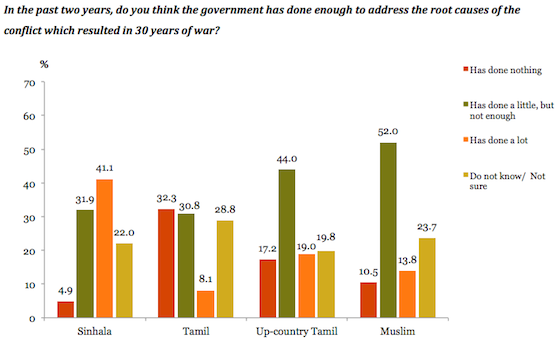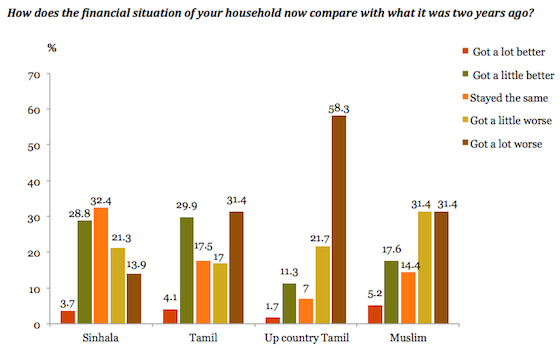Democracy in post-war Sri Lanka – A nation divided in opinion
According to a new survey conducted by Social Indicator, the survey research unit of the Centre for Policy Alternatives, Sri Lankans are divided in opinion on the topic of reconciliation – about whether the government has done enough with regard to addressing the root causes of the conflict.
The topline survey report is available for immediate download here. It can also be viewed online here.
32.3% of people from the Tamil community have stated that the government has done nothing while 41.1% of people from the Sinhala  community have said that the government has done a lot. 44% from the Up Country Tamil community and 52% from the Muslim community believe that the government has done a little, but not enough in addressing the root causes of the conflict.
community have said that the government has done a lot. 44% from the Up Country Tamil community and 52% from the Muslim community believe that the government has done a little, but not enough in addressing the root causes of the conflict.
The survey, ‘Democracy in post-war Sri Lanka’ sought to record public perspectives on democracy in Sri Lanka today – what it means to people, how they participate in it, their perceptions of and confidence in governance frameworks and key institutions. Some of the key sections in the survey include economy and security, views on and consumption patterns of Sri Lankan media, perceptions about politics, assessment of freedom, assessment of political leaders, government performance, corruption and development.
The survey, carried out in all 25 districts of the country, interviewed 1993 people from the four main ethnic groups. The selection of respondents was random across the country except in certain areas where access was difficult. Fieldwork was conducted from March to June 2011.
With regard to a political solution for Sri Lanka’s ethnic issue, 29.7% of Sinhala, 59.1% of Tamil, 30.8% of Up Country Tamil and 53.5% of Muslim communities think that the Constitution should be changed based on recommendations made by an all party committee to produce a political solution to the country’s ethnic problem. However, 17.6% Sinhala, 4% Tamil, 11.1% Up Country Tamil and 14.2% Muslim communities said that there is no need for a political solution as the LTTE was completely defeated militarily.
People from all four communities are united in opinion about what they would like to see from the current development process, with a reduction in the cost of living being the top priority for all. For the Sinhala community, improved infrastructure is the second result they would like to see from the current development process while for the other three communities it is addressing unemployment and the creation of more jobs.
65% of Sri Lankans, mostly from the Sinhala community, do not think that corruption can be ignored even if the country is developing apace. Furthermore, it is among the police that most respondents from all four communities believe that corruption is most prevalent.
In their assessment of the economy, most of the respondents from all four communities believe that the government is doing a good job. However, 26.2% of Sinhala, 24% of Tamil, 18.4% of Up Country Tamil and 29.2% of the Muslim respondents said that the government has not been doing a good job in managing the economy.
However, 26.2% of Sinhala, 24% of Tamil, 18.4% of Up Country Tamil and 29.2% of the Muslim respondents said that the government has not been doing a good job in managing the economy.
10.7% of Sri Lankans said that the general economic situation in the country has got a lot better while 38% said that it has got a little better. However, 19.7% said that it has got a little worse while 16% said it has got a lot worse. It appears that when it comes to the financial situation at the household level, for most people it has not got better in the past two years. Only 3.7% of Sri Lankans believe it has got a lot better, while 27% said it has only got a little better. 58.3% of Up Country Tamil respondents said that the financial situation in their households has a got a lot worse in the past two years.
Social Indicator (SI) is the survey research unit of the Centre for Policy Alternatives (CPA) and was established in September 1999, filling a longstanding vacuum for a permanent, professional and independent polling facility in Sri Lanka on social and political issues. Driven by the strong belief that polling is an instrument that empowers democracy, SI has been conducting polls on a large range of socio‐economic and political issues since its inception.
Please contact Iromi Perera at iromi@cpasocialindicator.org for further information.

October 23, 2011 at 3:19 am
[…] cpa lankastandard.com […]
August 24, 2011 at 10:18 am
I know that a comprehensive survey on a matter of such vital importance can be pretty daunting, expensive and would need a huge field staff perhaps. In that context, the results of this survey, while welcome, is i am afraid, not an adequate indicator of a broad national opinion.
quote: 32.3% of people from the Tamil community have stated that the government has done nothing while 41.1% of people from the Sinhala community have said that the government has done a lot. 44% from the Up Country Tamil community and 52% from the Muslim community believe that the government has done a little, but not enough in addressing the root causes of the conflict.
A broader survey could well change those statistics which could well read that ” 85 % of the Tamil community…..90 percent of the Sinhala community, 75 % of up-country Tamils and 71 % of Muslims.
But , where will such a comprehensive survey still leave us ? With the government doing more ? Will the govt/opposition politicians, clergy et al be persuaded by these surveys tpo come tyogether and do more, cpoollectively ?
The surveys are a pointer to the direction in which national opinion is moving or is bogged down in.
But at the end of the day it’s really a few more statistics which tell us that we are still as far as we ever were from a solution to the national ethnic crisis, for that’s what it is, a crisis that so far has defied solution.
August 19, 2011 at 5:42 pm
[…] is the Survey on Democracy in Post-War Sri Lanka, Topline Report July 2011, conducted and published by the Social Indicators unit of the Centre for […]